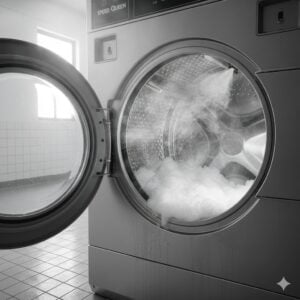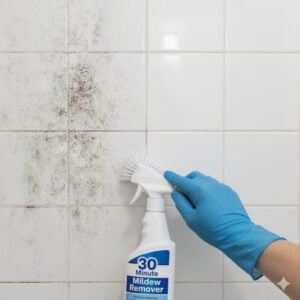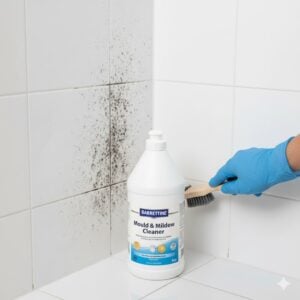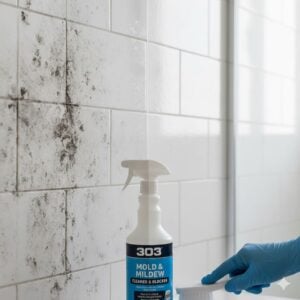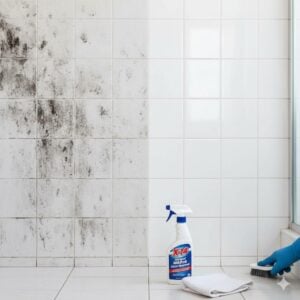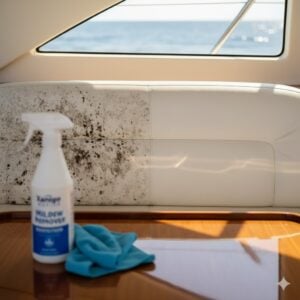In the UAE, especially in cities like Dubai or Abu Dhabi, indoor odors can become a serious problem fast. Whether it’s pet smell, old cooking fumes, cigarette smoke, or something worse—once it sets in, it doesn’t just go away by opening a window. That’s where odor cleaner solutions come in.
Unlike regular air fresheners that only cover up the smell, a proper odor cleaner works to neutralize the source of the odor. If you’re tired of spraying every corner of your home only for the smell to return the next day, you’re not alone. Many homes, offices, and even cars across the UAE face the same challenge—thanks to the region’s heat, humidity, and tight indoor spaces.
In this guide, we’ll walk you through what odor cleaners are, the different types available, and how to choose the right one for your situation. We’ll also cover why professional help is sometimes the smarter move, especially when the smell becomes overwhelming.
Table of Contents
Toggle1. What Is an Odor Cleaner and Why Does It Matter?
An odor cleaner is not the same as your everyday air freshener. It’s a specially formulated product or process designed to eliminate unpleasant smells at their source—rather than just mask them with fragrance. This matters because most indoor odors don’t just float around in the air—they cling to fabrics, walls, carpets, curtains, and even air ducts.
Think about it: a cooking smell after frying fish, cigarette smoke in your car, pet urine in a corner—these smells soak into materials and won’t leave with simple mopping or spraying. That’s why many homeowners get frustrated when the “lemon spray” or lavender plug-in only seems to work for a few hours.
Odor cleaners come in many forms: enzyme-based sprays that break down organic material, ozone generators that purify the air, activated charcoal that absorbs airborne particles, and even fogging solutions used by professional cleaners. We’ll explore each of them next—but the key point is this: if you want to truly remove an odor, you need more than just a pleasant smell—you need a science-backed cleaner that neutralizes the source.
Whether you’re trying to freshen up your living room, eliminate smoke from a car, or remove strong cooking odors in a rental flat, understanding what kind of cleaner to use is your first step toward breathing fresh air again.
2. Different Types of Odor Cleaners
Not all odors are created equal, and the same goes for odor cleaners. Depending on what’s causing the smell—whether it’s smoke, pets, mold, or trash buildup—different tools and formulas are needed. Here’s a breakdown of the most common types of odor cleaners, explained in a simple, practical way.
1. Enzymatic Cleaners
These are great for organic smells like urine, sweat, or food waste. Enzyme cleaners work by breaking down the molecules that cause the bad odor. They’re often used on carpets, sofas, and mattresses, making them a go-to for pet owners or families with toddlers.
2. Activated Charcoal
If you’re looking for a low-maintenance, passive solution, charcoal is your friend. It works by absorbing odor particles from the air and trapping them. You’ve probably seen small charcoal pouches or containers sold for closets, cars, or bathrooms. They’re cheap, safe, and long-lasting—but not ideal for severe or embedded smells.
3. Ozone Generators
Used by professionals, these machines release ozone gas to break down airborne particles, neutralizing odors in the air and on surfaces. They’re powerful and effective—but they must be used in unoccupied spaces because ozone is dangerous to breathe in high amounts. Ozone is ideal for cigarette smoke, mold, or after fire cleanup.
4. Fogging Machines
This technique involves filling a room with a deodorizing fog that reaches all nooks and crannies. It’s often used in post-death or hoarding cleanups, but also useful in treating commercial kitchens or hotel rooms with persistent smells. It leaves behind a fresh scent while neutralizing the deeper cause of odor.
5. Essential Oil-Based Sprays
For light odors or daily freshness, sprays made with essential oils like tea tree, eucalyptus, or lemon offer a more natural option. They’re not always powerful enough for deep odors, but they’re great for maintenance between deeper cleanings.
Each of these odor cleaner types has its place. The key is matching the right solution to the level of the problem. And that brings us to the next important question—how do you choose?
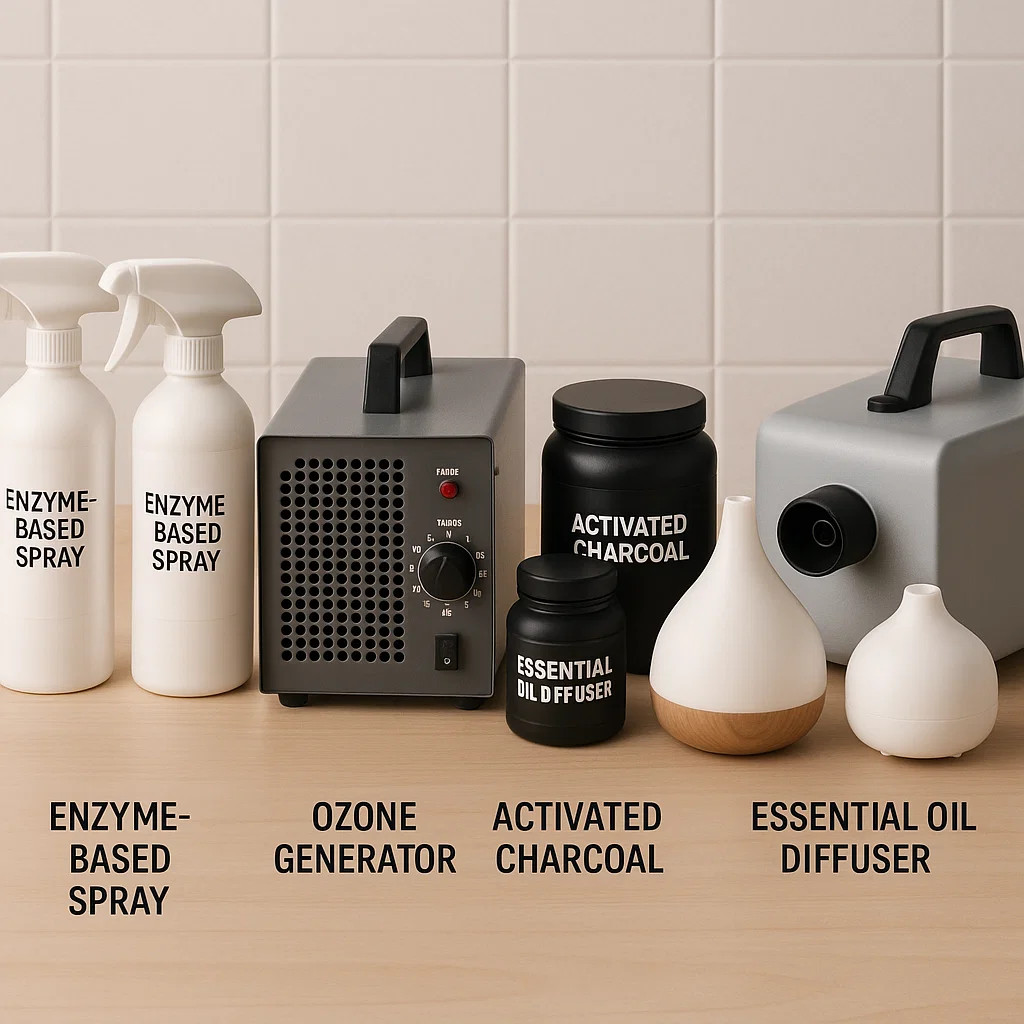
3. Choosing the Right Odor Cleaner for Your Situation
Choosing the best odor cleaner depends on two main things: the source of the smell and how long it’s been there. Let’s walk through a few common scenarios we see across homes and businesses in the UAE—and what usually works best for each:
Pet accidents: If your dog or cat had an accident on the carpet, an enzymatic cleaner is your best first step. Don’t just mop it with water—urine can seep into the padding. Enzymes will break down the bacteria causing the smell. Follow it up with a charcoal pouch in the room for passive absorption.
Cigarette smoke in a car: Smoke embeds itself in upholstery and vents. For this, a fogging treatment or ozone machine is often needed. These clean the air and surfaces at once. Car sprays rarely do more than hide the scent.
Mold or musty smell in rooms: These odors suggest moisture problems. While essential oils may help short-term, mold requires serious attention. An ozone generator or professional mold remediation might be necessary. Always dry the area and identify water leaks before treating.
Post-party food smells: A lingering blend of grilled meats, oil, or spices can settle into curtains, couches, and AC filters. Open windows first, then try a combo: enzymatic spray for fabrics, charcoal blocks in corners, and a quick fog treatment if needed.
Fridge or trash odor: Scrub with baking soda or vinegar-based solutions. For stubborn smells, place activated charcoal or even a slice of lemon inside the compartment. Replace it every few days.
One quick tip: Always test a small spot before using any cleaner on fabric or furniture to avoid staining or damage. And remember—if the smell keeps coming back after several treatments, it might be time to call in a professional odor cleaning service like ours to investigate further.
4. When to Call in the Professionals
Sometimes, even after trying all the sprays and tricks in the book, the smell just doesn’t go away. That’s usually a sign that the odor has gone deeper—into the walls, air ducts, or materials you can’t reach. This is when calling a professional odor cleaning team is your smartest move.
At Bio-On, we’ve seen it all—from apartments with moldy walls to villas filled with lingering pet smells. We don’t just spray and go. Our process includes inspection, treatment planning, and the use of heavy-duty equipment like ozone generators, commercial-grade foggers, and high-suction vacuums. We also make sure the process is safe for families, kids, and pets.
If the smell is related to a sensitive situation—like a death cleanup, hoarding condition, or smoke from a recent fire—we also handle that with the discretion and compassion it deserves. You won’t have to explain anything twice. We come equipped and ready to restore your home or office without judgment, only results.
The rule of thumb is: if you’ve tried two or three odor cleaner methods and the smell still comes back, or if the source of the smell is unknown or unreachable, it’s time to bring in professionals. Trust us—it’ll save you more time and stress in the long run.
5. Odor Cleaning in the UAE: What Works Best Locally
Living in the UAE presents unique challenges when it comes to odor. Our climate is hot and humid for most of the year, which can speed up the breakdown of organic material—and make smells much worse. Add in closed windows, strong AC usage, and occasional dust storms, and you’ve got the perfect storm for indoor odor problems.
We also know that in areas like Dubai Marina or high-rise buildings in Abu Dhabi, ventilation can be poor, which traps smells for longer. Villas with pets or older plumbing may also experience more stubborn smells that return frequently. In Ras Al Khaimah and Sharjah, for example, we often deal with waste buildup odors in kitchens or outdoor bins.
What works best? In our experience, a mix of the right cleaner for the job—paired with smart ventilation, humidity control, and regular deep cleaning—is the best local strategy. Using activated charcoal near trash bins, dehumidifiers in closed rooms, and monthly odor fogging for offices or shared spaces makes a big difference.
And when that’s not enough, our 24/7 local team is always available. We operate in all Emirates and arrive fully equipped for any odor emergency. If you need us, just click the Contact button on the right-middle of this post, and we’ll take care of the rest.
Conclusion
No one should have to live or work in a space that smells unpleasant. Whether it’s mild or overwhelming, persistent odors can ruin your comfort and peace of mind. The good news? With the right odor cleaner—and knowing when to handle it yourself versus calling a professional—you’re in full control of your space again.
We hope this guide helped you understand what works, what doesn’t, and what to try next. And if you’re dealing with a smell that just won’t go away—remember, we’re here for you. Just click the Contact button on the right-middle of this post and let us help you breathe fresh again, anytime across the UAE.








